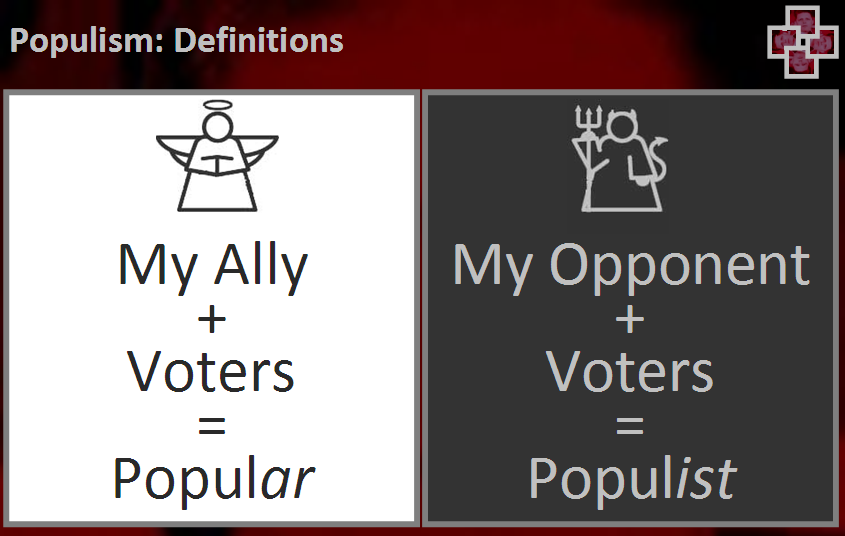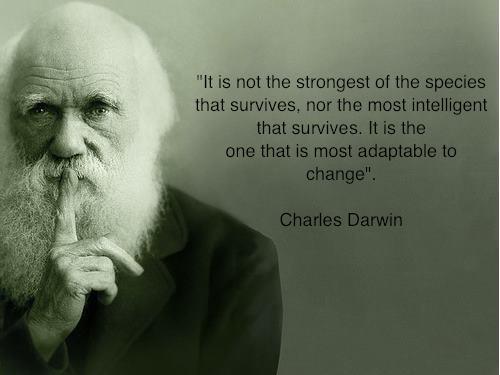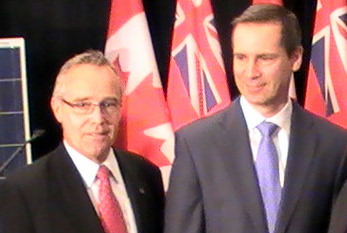
This is how partisan politics works, people - especially at campaign time when Political Parties are hell-bent on winning votes or decreasing voter confidence in their opponents. Of course, campaign season tends not to end these days.
The other guys are incompetent, indecisive, fundamentally dishonest, dangerous. They're reptilian kitten eaters, they want to put soldiers on your streets - they
are the zombie hoard.
Only (insert leader's name here, but really mean their backroom teams)
can keep the barbarian tide at bay.

In any sphere other than politics, this would all come across as childish bullying, the kind of thing politicians purport to stand against. So why is it unacceptable everywhere else but perfectly legitimate in politics?
Well, you know - because the stakes are so high. The other guys will rape, pillage, salt the fields, so on and so forth. They must be stopped at all costs, meaning whatever means are justified.
This sort of thinking is just this side of gang warfare, which is appropriate - at its core, politics has nothing to do with policy and everything to do with tribal dominance.
Imagine calling a respected journalist a liar because they brought forward an uncomfortable truth about your Machiavellian positioning.

Anywhere else, this would be frowned upon; in today's politics, it's business-as-usual.
What's really sad is how this mindset, once entrenched at the top, starts to infect the Party and Party loyalists all down the chain.
This is how populism works - stoke the fires, put enemies in your crosshairs and feed simple solutions that appeal to base instincts. Do it loudly enough, rapidly enough and exaggerate the stakes enough, your hoard will ignore all else and become a partisan mob.
Isn't this the MO of Rob Ford and Ford Nation? More on this later.
This morning I had a back-and-forth on Twitter with Carolyn Hudson, an NDP supporter. I only know Carolyn through Twitter, but we've had some good debates in the past; we've disagreed on issues and agreed on issues, but always, I felt, in a respectful manner.
Which is why I found this particular interaction surprising:
You're more than welcome to go back and check out our twitteraction; I can only record my own impressions here.
Carolyn was, as partisans do in the heat of battle, throwing down talking points like they were gospel. She was citing poll numbers as if they were scientific truths and, worst of all, implying the moral superiority of her team vs the fundamental dishonesty of the other guys. We should be trusted, the base-line argument goes, because we're better than they are - they are evil, we can do no wrong.
Having seen numerous times how an assumption of moral superiority leads to an assumption of superiority, period, I consider it a moral duty to remind people that we all come from the same place and are capable of the same egregious behaviour. Dehumanizing others in any shape or form allows us to rationalize doing unto them what we wouldn't do unto others of our own physical or ideological "race."
I called her on this and tried to engage a thoughtful conversation that deconstructed messaging and spin and draw focus to the fact that it's not one party or other but the nature of the system as-is that fuels poor decision-making. By setting themselves up as morally superior, the NDP (should they win) are really just setting themselves up for a greater fall, fueling civic mistrust of our entire political system.
Instead of counter-arguments, reflection or expansion, Carolyn tried to brand me as an Other by pointing out my career history and then, eventually, found the quickest way to disengage with me all together.
If I'm not with her, I'm clearly against her and her Party, meaning I'm not worth her time. Whatever people like me have to say can therefore be dismissed without consideration for validity.
That kind of confabulation is dangerous.
Whatever helps us win, matters; whatever doesn't isn't relevant. Can't have
too many priorities, etc.

Which brings us back to Rob Ford and Ford Nation.
It doesn't matter what Rob Ford does - he has a die-hard base that will not waver. Ford validates their anger and bitterness against; that's what matters.
Rob Ford can break the law, take drugs, verbally abuse women, physically abuse his friends, do drugs with gangsters, put the lives of others - including his own children - at risk, but none of it matters. The facts don't matter; instead, their revelation feeds the narrative of Ford as a modern-day Jesus, a martyr being picked on by snooty elites and their spin.
If someone challenges Ford Nation's view of Ford, this is justification enough to tune them out, no matter how valid their arguments.
People who disagree with you, after all, aren't worth your time. In fact, they are dangerous and untrustworthy and need to be ignored, contained or destroyed.
It's true that Ford is an exception in the extensiveness of his bad behaviour and complete disregard for evidence, the truth and consequence, but he's really on the same spectrum as everyone else.
How easily do any partisans ignore facts that disagree with their arguments or support the simplified talking points issued by their tribe?
The more heated the contest becomes, as it is during Ontario's current tight election race, the more extreme become the tactics people accept as reasonable.
So what happens if this election produces another minority government, which seems rather likely? How does the heightened, anything-goes mentality get toned down so as to allow Parliament to function?

If you're a partisan, the hope is that after the election, at least one of the existing leaders will step down, eliminating that iteration of your oppositional Other as a threat. Then you simply reload your bazooka and get ready to blow off the head of the next version. In perpetuity.
They keep coming, those inhuman Others, and how else do you kill a zombie except by cutting off its head?
The big thing that rabid partisans are missing is that,
by dehumanizing opponents, they are equally dehumanizing themselves. When we start to blindly accept partisan spin and relish the opportunity to focus solely on the faults of those we dislike we become mindless, flesh-hungry partisan zombies ourselves.
Most Canadians/Ontarians/people aren't rabid partisans; they want society to function and are increasingly frustrated with anyone they see as part of why it doesn't.
If and when they become reactive enough and fully assume that all politicians are one mindless, faceless Other, it won't be one Party's head they come for.



























 MyTimHortons
MyTimHortons 


















